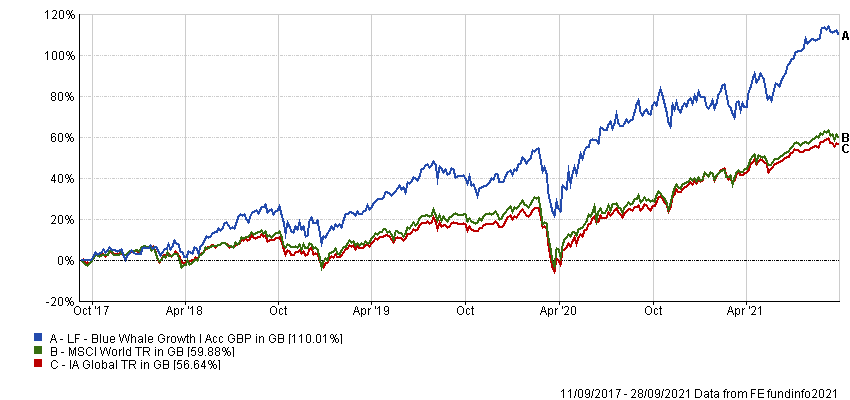Large parts of the US market have entered bubble territory, according to Stephen Yiu, manager of the LF Blue Whale Growth fund, who warned that even the quality businesses in his portfolio would be dragged down if it burst.
However, he said they would recover much faster than the market once any panic subsided and the focus returned to fundamentals.
The US market currently looks expensive on a variety of metrics, with its cyclically adjusted P/E now on about 38x, for example, compared with 23x for its average over the past 15 years.
And although the US makes up 70% of the regional weighting in LF Blue Whale Growth, compared with 54% from its IA Global sector, Yiu (pictured) warned large areas of this market looked vulnerable.
“We invest in the best 25 to 30 names which we deem as superior quality businesses, and we try to invest in and hold shares at very attractive valuations, but I don't dispute the fact that the rest of the stock market, especially in the US, is probably in some sort of mini bubble,” he said.
“There are a lot of loss-making businesses trading at extreme valuations and there are some really cyclical low-quality businesses that are trading at a premium to historical highs.”
Much of the talk of a bubble has been focused on tech, with many investors afraid of missing the next big thing. Yet this is a sector that appears to have a high weighting in the LF Blue Whale Growth fund, with Adobe, Alphabet [Google], Facebook, Microsoft and Nvidia in its top-10.
However, Peter Hargreaves, who co-founded Blue Whale with Yiu, said he would not refer to these as tech stocks.
“The fund invests in businesses that make the best use of existing technology, not new technology,” he explained.
“Amazon is not a technology firm, it is just the world's greatest retailer, which uses the internet to the greatest advantage.
“Many of our other businesses are the same. The world has changed and the businesses that have embraced these new technologies will persevere.”
At the same time, Hargreaves said he was only interested in scalable businesses, and the only businesses that don’t rely on technology are those that aren’t scalable.
“They are professional services companies where it’s one to one,” he continued. “And of course, they are very difficult to scale: the only way they can grow is if they double their number of employees.
“That's not where you want to invest: you want to invest in companies that can double their business but only increase their workforce by 5%. And that's what technology does for you.”
Yiu added: “There is a misconception when people talk about a tech bubble, and we do see many companies within that sector that we would never be interested in, like Uber and Airbnb, even Tesla and Netflix: we deem those companies as very low quality.
“But if you look at the valuations, they're trading quite expensively, so we want to avoid them at all costs.”
Inflation has been cited as one of the threats that could bring the market crashing down. Many analysts claim that the quality growth companies of the type favoured by Yiu would be at risk against a backdrop of rising prices.
For example, Alessandro Dicorrado of the Ninety One Global Special Situations fund said: “After a decade-long bull market, the discount rates that are being used to value many quality growth stocks have been reduced to justify ever-rising prices. The key question to ask with inflation is, what happens to valuations if equity discount rates increase?”
However, Hargreaves and Yiu were relatively unconcerned about this threat, with the former saying, “people have been forecasting high inflation for 20 years, and it hasn't happened”.
More importantly, Yiu pointed out that lumping all quality growth stocks under the same banner was unwise.
“I’ll give you one example,” he said. “A few weeks ago, Microsoft announced it was going to raise prices for Office 365 subscriptions by 15 to 20%. This has nothing to do with inflation and obviously this company was $2trn to start with.
“So a professional user of Office 365 through Teams or Excel is just stuck with paying more money in the next few years.
“This company is growing the top line by over 10% year on year, there's no input pricing pressure because most inputs are software and people, and gross margin are close to 90%, so inflation is not going to affect that.”
He contrasted this with Unilever, which is also regarded as a quality growth stock. It recently reported margin pressures because of the rising cost of oil and other inputs.
Yet the company was worried that if it raised prices, it could push customers into other products such as those owned by Procter & Gamble, Nestlé or even supermarkets’ own brands.
“But if you are in the camp that could raise prices and your customers are still happy with your product, that is one of our criteria to define great businesses,” Yiu finished.
Data from FE Analytics shows LF Blue Whale Growth has made 110% since launch in September 2017, compared with gains of 59.9% from the MSCI World index and 56.6% from the IA Global sector.
Performance of fund vs sector and index since launch

Source: FE Analytics
The £982m fund has ongoing charges of 0.87%.






